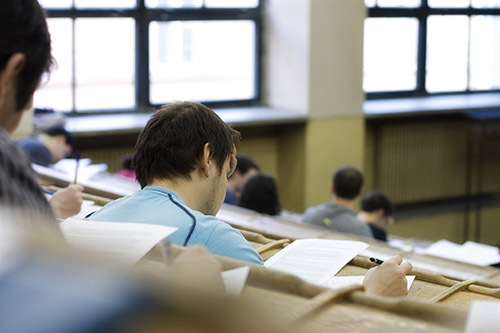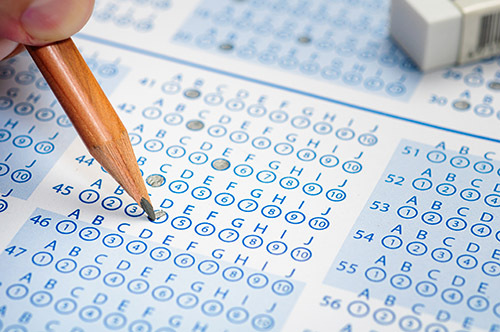
"American schools are not failing; they are getting the best results in our history."
-- Richard Dufour
Educator and best-selling author Dr. Richard DuFour investigates the state of education today in his new book, In Praise of American Educators - And How They Can Become Even Better. Richard was a public school educator for 34 years, serving as a teacher, principal, and superintendent. He wrote his latest book because of what he calls the "continuing unfair characterization of American schools as failing." He believes US schools are currently showing their best results ever and he also believes the harsh policies being directed at US public schools have failed because they were based on "faulty assumptions." Dufour was diagnosed with stage 4 lung cancer last year. He hopes his book will persuade policy makers, educators and parents that the best way forward for sustainable school improvement is to build "the capacity of educators to work as members of a professional learning community." Richard is recognized as one of the leading authorities on helping school practitioners implement the Professional Learning Communities at Work process in their schools and districts. He joins us today in The Global Search for Education.

"If the PISA tests were used to highlight and address the detrimental effects of poverty and how those effects can be overcome, they could be very beneficial. If they are used to disparage American schools with the blanket condemnation that they are failing, they are of no use." -- Richard Dufour
Welcome Richard. What do you hope will be the main takeaways from your book?
The main takeaways are first, American schools are not failing; they are getting the best results in our history in areas such as graduation rates, pursuit of more rigorous curriculum, performance on the Trends in International Mathematics and Science (TIMMS), achievement on the National Assessment of Educational Progress (NAEP), parent satisfaction with their local schools, and student perceptions of their teachers compared with students around the world.
Secondly, because the consequences of a student's failure to succeed in the K-12 setting have never been more dire, educators must become much more effective in helping all students to learn at high levels.
Finally, we know the key to helping more students to achieve at higher levels - building the capacity of educators to work as members of true professional learning communities.

"If we want the 4C's to be the focus, we must discover ways to monitor the presence of these skills in ways that will not put teachers at risk. Teachers must also be supported with focused professional development on the nature of the skills, the pedagogical practices that foster them, and varied assessment strategies to monitor them." -- Richard Dufour
How much attention should policy makers and educators be paying to international tests such as the PISA test in which the US continues to fare poorly. Are these tests an indicator of how we are doing?
These tests warrant attention but also require deeper analysis of the results. For example, the performance of American students on PISA is cited as proof that our schools our failing. But let's look deeper. The United States has one of the highest child poverty results of all the nations who take the PISA Exam. For the first time in history, the majority of students in public schools qualified for the free and reduced lunch program. One in five public schools in America have over 75% of their students living in poverty. It is the performance of these schools that drags down our national scores. If American schools with up to 25% of students living in poverty were considered as a cohort, we would be among the highest performing nations in the world. So if the PISA tests were used to highlight and address the detrimental effects of poverty and how those effects can be overcome, they could be very beneficial. If they are used to disparage American schools with the blanket condemnation that they are failing, they are of no use.
Given the shift in focus in the global education reform debate from the 3 R's to the 4 C's, what are the critical steps we need to take to produce a new education framework for the US?
The United States is one of the few countries that tests all students every year. The rigor of those tests has typically rarely risen beyond recall of information on multiple choice questions. So teachers face the dilemma that their students' learning (and the individual teacher's effectiveness) will be judged on the basis of recall of information at the same time there is general agreement that the 21st century skills demand creativity, critical thinking and problem solving, communication, and collaborating with others. Until high-stakes assessments begin to reflect these priorities, higher order skills will continue to get short shrift in schools. The adage, "what gets monitored gets done," applies here. If we want the 4C's to be the focus, we must discover ways to monitor the presence of these skills in ways that will not put teachers at risk. Teachers must also be supported with focused professional development on the nature of the skills, the pedagogical practices that foster them, and varied assessment strategies to monitor them.

"We must change the narrative of what it means to be a teacher from the current story that paints uncaring educators as the problem of American education to one in which teachers are recognized as the crucial nation builders that they are."
-- Richard Dufour
How can we make teaching a more prestigious career? How can we entice better quality talent away from more lucrative careers and into classrooms? How do we retain good teachers and make sure they are where they are needed most?
We can raise the standards for entry into the profession and award full scholarships to those who agree to teach at least five years. In most high-performing nations, prospective teachers must earn the equivalent of a master's degree before they begin teaching. In the United States, we seem to assume that any college graduate can be a teacher in six weeks. We must stop issuing teaching certificates to people who have little or no training in either content or pedagogy. We must also stop assigning teachers to teach content in which they are not trained or certified. We are one of the only nations to use this practice. We have to raise starting salaries for teachers based on average salaries of those who enter the workforce with a bachelor's degree. College graduates in the United States in 2014 had an average college debt of $29,000. American teachers earn 68% of the average starting salary for graduates with bachelor's degrees. In industrialized countries whose students take the PISA exam, new teachers make 88% of the average starting salary for those with bachelor degrees. In Finland, it is 109%. We must also create meaningful career ladders that allow teachers to advance through stages of a career without being required to leave the classroom. Singapore offers three different multi-tiered tracks through which teachers can advance. We need to end the relentless criticism of teachers and schools, and ill-conceived and ineffective policies that punish teachers.
Attempts to send highly effective teachers into troubled schools through higher salaries and bonuses have generally failed. Educators have consistently reported that the climate and culture of the school and the nature of its leadership have a greater impact on teacher satisfaction and retention. To keep good teachers in troubled schools, we must develop the collaborative culture, collective responsibility, widely dispersed leadership, schoolwide commitment to the learning of each student, and celebration of incremental progress that characterizes high-performing professional learning communities.
In conclusion, increasing access to education has been a hallmark of the American experience and a key to its progress. The common school, the Merrill Land-Grant Act that provided every state with the resources to build colleges for agriculture and manufacturing, the creation of public high schools, and the G.I. Bill which established that military veterans should have access to higher education are key elements of the expansion of educational opportunity. Now we must decide if we are committed simply to ensure students have access to school or if they are entitled to high levels of learning. Finally, we must change the narrative of what it means to be a teacher from the current story that paints uncaring educators as the problem of American education to one in which teachers are recognized as the crucial nation builders that they are.
(All Photos are courtesy of CMRubinWorld)
Join me and globally renowned thought leaders including Sir Michael Barber (UK), Dr. Michael Block (U.S.), Dr. Leon Botstein (U.S.), Professor Clay Christensen (U.S.), Dr. Linda Darling-Hammond (U.S.), Dr. MadhavChavan (India), Professor Michael Fullan (Canada), Professor Howard Gardner (U.S.), Professor Andy Hargreaves (U.S.), Professor Yvonne Hellman (The Netherlands), Professor Kristin Helstad (Norway), Jean Hendrickson (U.S.), Professor Rose Hipkins (New Zealand), Professor Cornelia Hoogland (Canada), Honourable Jeff Johnson (Canada), Mme. Chantal Kaufmann (Belgium), Dr. EijaKauppinen (Finland), State Secretary TapioKosunen (Finland), Professor Dominique Lafontaine (Belgium), Professor Hugh Lauder (UK), Lord Ken Macdonald (UK), Professor Geoff Masters (Australia), Professor Barry McGaw (Australia), Shiv Nadar (India), Professor R. Natarajan (India), Dr. Pak Tee Ng (Singapore), Dr. Denise Pope (US), Sridhar Rajagopalan (India), Dr. Diane Ravitch (U.S.), Richard Wilson Riley (U.S.), Sir Ken Robinson (UK), Professor Pasi Sahlberg (Finland), Professor Manabu Sato (Japan), Andreas Schleicher (PISA, OECD), Dr. Anthony Seldon (UK), Dr. David Shaffer (U.S.), Dr. Kirsten Sivesind (Norway), Chancellor Stephen Spahn (U.S.), Yves Theze (LyceeFrancais U.S.), Professor Charles Ungerleider (Canada), Professor Tony Wagner (U.S.), Sir David Watson (UK), Professor Dylan Wiliam (UK), Dr. Mark Wormald (UK), Professor Theo Wubbels (The Netherlands), Professor Michael Young (UK), and Professor Minxuan Zhang (China) as they explore the big picture education questions that all nations face today.
The Global Search for Education Community Page
C. M. Rubin is the author of two widely read online series for which she received a 2011 Upton Sinclair award, "The Global Search for Education" and "How Will We Read?" She is also the author of three bestselling books, including The Real Alice in Wonderland, is the publisher of CMRubinWorld, and is a Disruptor Foundation Fellow.

